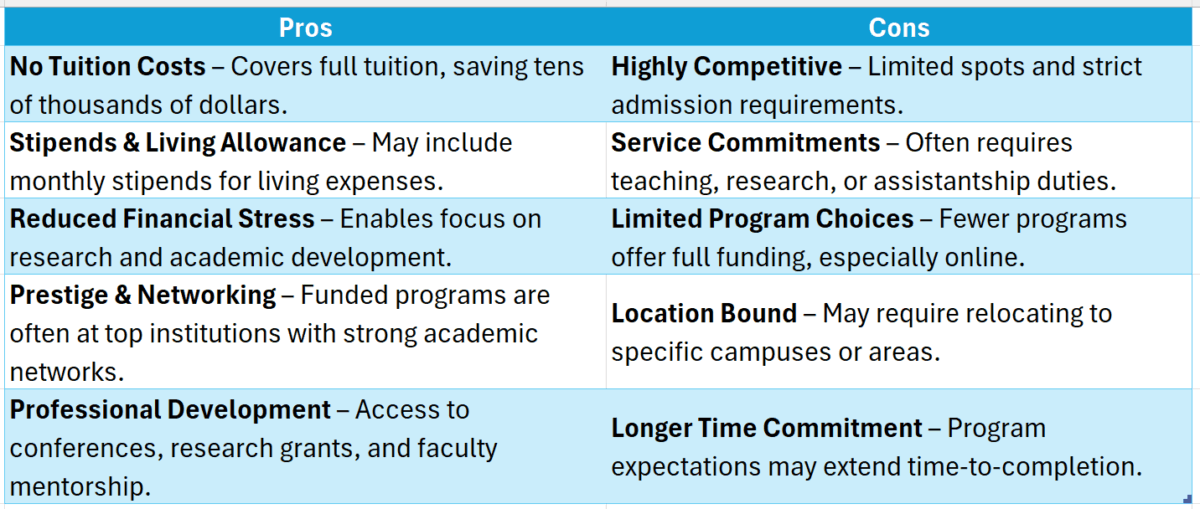Many aspiring educators ask, “Are there fully funded doctoral programs in education?” This question is vital as these programs can ease financial burdens, allowing students to concentrate on their studies and research. Let’s explore what these programs offer and their impact on your educational path.
What Are Fully Funded Doctoral Programs?
Fully funded doctoral programs in education usually cover tuition and provide a living stipend. This financial support often requires students to take on teaching or research assistantships, which can enhance their resumes.
Benefits of Fully Funded Programs
- Financial Relief: No tuition means reduced debt after graduation.
- Research Opportunities: Gain practical experience in your field.
- Networking: Build connections with professionals and peers in education.
Exploring Post Doctoral Opportunities
After earning your doctorate, consider a post doctoral in education. These roles can lead to advanced research or teaching positions at universities, opening doors to various jobs for doctorate in education. In conclusion, fully funded doctoral programs in education can significantly impact your academic and professional journey, providing essential financial support and valuable experiences.
Contact Now to Pursue Your Dream Degree From Your Nearest College
What Makes a Doctoral Program Fully Funded?

When considering a doctoral program in education, many prospective students wonder, “Are there fully funded doctoral programs in education?” This question is crucial because funding can significantly impact your educational journey and future career. A fully funded program can alleviate financial stress, allowing you to focus on your studies and research.
A fully funded doctoral program typically covers tuition and provides a stipend for living expenses. Here are some key features:
- Tuition Waivers: These programs often waive tuition fees, meaning you won’t have to pay for classes.
- Stipends: Many fully funded programs offer stipends to help cover living costs, making it easier to focus on your studies without worrying about finances.
- Research or Teaching Assistantships: Students may work as research or teaching assistants, gaining valuable experience while receiving financial support.
In addition to these benefits, graduates of fully funded programs often find rewarding jobs for doctorate in education, paving the way for successful careers in academia or leadership roles in educational institutions.
Are There Fully Funded Ed Doctoral Programs Available?
Are you dreaming of earning a Doctorate in Education but worried about the costs? You’re not alone! Many aspiring educators wonder if there are fully funded doctoral programs in education available. These programs can be a game-changer, allowing you to focus on your studies without the burden of student debt.
Yes, there are fully funded doctoral programs in education! These programs often cover tuition and provide a stipend for living expenses. They can be competitive, but the benefits are significant. You can gain valuable experience while pursuing your degree, which can lead to exciting jobs for doctorate in education graduates.
Benefits of Fully Funded Programs:
- Financial Relief: No tuition fees mean less financial stress.
- Research Opportunities: Many programs offer teaching or research assistantships.
- Networking: Connect with professionals in the field, enhancing your career prospects.
The Benefits of Pursuing a Fully Funded Ed Doctorate
Pursuing a fully funded Ed Doctorate can transform the lives of aspiring educators by alleviating financial burdens and opening up numerous opportunities. Understanding the benefits of these programs is crucial for making informed academic decisions.
Financial Freedom
A major advantage of fully funded doctoral programs in education is the financial support they provide. Without the worry of tuition fees or student loans, you can concentrate on your studies and research, leading to a more enriching educational experience.
Career Advancement
Holding a doctorate in education can greatly enhance your career prospects. A fully funded program allows you to acquire valuable skills without financial strain, paving the way for better jobs for doctorate in education holders, such as university faculty or administrative roles.
Networking Opportunities
Participating in a funded program often grants access to a network of professionals and mentors, which is invaluable for your career. This can be especially beneficial if you’re considering a post doctoral in education, as these connections can lead to future collaborations and job opportunities.
How to Find Fully Funded Doctoral Programs in Education
Finding fully funded doctoral programs in education can be challenging, but they do exist and can greatly reduce the financial burden of obtaining a doctorate. Knowing how to find these opportunities is essential for aspiring educators aiming to advance their careers without incurring debt.
Explore University Websites
Start by visiting the official websites of universities that interest you. Look for sections on graduate programs and funding opportunities, as they often list scholarships or assistantships specifically for education students.
Network and Seek Guidance
Connecting with current students or alumni can provide valuable insights and help you discover lesser-known programs. Additionally, reaching out to professors in your field can be beneficial, as they often have knowledge about available funding options.
Benefits of Fully Funded Programs
- No Tuition Fees: Save significantly on education costs.
- Stipends: Many programs provide stipends for living expenses.
- Research Opportunities: Engage in research that can lead to post doctoral in education positions or jobs for doctorate in education.
By following these steps, you can enhance your chances of finding a fully funded doctoral program that suits your needs.
Common Misconceptions About Fully Funded Doctoral Programs
When considering a Doctorate in Education, many aspiring students ask, “Are there fully funded doctoral programs in education?” This question is vital, as funding significantly impacts your educational journey. Understanding funding options helps you make informed decisions about your future.
Many believe that fully funded doctoral programs in education are rare or limited to prestigious universities. However, this is not entirely true. While competition is fierce, several institutions offer funding that covers tuition and living expenses. Here are some misconceptions:
- Only Ivy League Schools Offer Funding: Many state universities and smaller colleges provide generous funding packages.
- Funding is Only for Research: Some programs offer funding for teaching assistantships, providing valuable experience while earning your degree.
The Reality of Funding Options
Fully funded programs do exist, but they often require hard work and dedication. Students may need to apply for scholarships or assistantships. Additionally, pursuing a post doctoral in education can lead to various jobs for doctorate in education, making the investment worthwhile. Explore your options and find the right fit for you!
Contact Now to Pursue Your Dream Degree From Your Nearest College
Tips for Applying to Fully Funded Ed Doctoral Programs
Finding fully funded doctoral programs in education can be challenging, but they do exist and can greatly reduce the financial burden of pursuing an EdD. Knowing how to navigate the application process is essential for prospective students.
- Research Thoroughly: Investigate universities that offer fully funded doctoral programs in education, focusing on those with strong education departments.
- Connect with Faculty: Reach out to potential advisors to build relationships that can enhance your application and provide insights into funding options.
- Prepare a Strong Application: Your statement of purpose should clearly articulate your goals and how they align with the program. Emphasize any relevant experience, particularly if you have held jobs for doctorate in education.
- Consider Post Doctoral Opportunities: After earning your EdD, look into post doctoral in education roles that may offer additional funding or research opportunities, further enriching your academic and career journey.
Applying for fully funded doctoral programs in education is competitive, but with the right strategies, you can improve your chances. Persistence and preparation are vital for accessing these valuable opportunities.
Success Stories: Graduates of Fully Funded Programs
Success in education often starts with the right program. Many aspiring educators wonder, “Are there fully funded doctoral programs in education?” The answer is yes! These programs not only cover tuition but also provide stipends, making it easier for students to focus on their studies without financial stress.
Inspiring Success Stories
Graduates from fully funded doctoral programs in education have gone on to achieve remarkable things. Here are a few examples:
- Dr. Sarah Johnson: After completing her fully funded Ed.D., she landed a prestigious position as a university professor, inspiring future educators.
- Dr. Mark Lee: He utilized his post doctoral in education to research innovative teaching methods, leading to a successful career in educational consulting.
Benefits of Fully Funded Programs
These programs offer numerous advantages:
- Financial Relief: Students can graduate debt-free, allowing them to focus on their careers.
- Networking Opportunities: Graduates often connect with influential professionals in the field.
- Diverse Career Paths: With a doctorate in education, graduates find jobs for doctorate in education, ranging from academia to administrative roles.
How CollegeDegree.Education Can Help You Navigate Your Doctoral Journey
Are you dreaming of earning a Doctorate in Education but worried about the costs? You’re not alone! Many aspiring educators wonder if there are fully funded doctoral programs in education that can help them achieve their goals without breaking the bank. Understanding your options is crucial for a successful academic journey.
At CollegeDegree.Education, we simplify your search for fully funded doctoral programs in education. We provide resources and guidance to help you find programs that not only cover tuition but also offer stipends for living expenses. This means you can focus on your studies without financial stress!
Key Benefits of Fully Funded Programs
- No Tuition Fees: Save thousands of dollars.
- Stipends Available: Get paid while you study.
- Networking Opportunities: Connect with professionals in the field.
Additionally, we offer insights into post doctoral in education opportunities and jobs for doctorate in education, ensuring you’re well-prepared for your career after graduation. With our support, your doctoral journey can be exciting and rewarding!
Contact Now to Pursue Your Dream Degree From Your Nearest College
FAQs
1. What does “fully funded” mean for a doctoral program in education?
A fully funded program typically covers tuition and provides a living stipend, often through fellowships, assistantships, or grants.
2. Are fully funded EdD programs common?
They are less common than PhD programs, but some universities do offer fully funded EdD programs, especially for students pursuing research or leadership in education.
3. What’s the difference between a PhD and EdD in education?
A PhD focuses on educational research and academia, while an EdD is designed for practitioners aiming for leadership roles in schools, districts, or policy.
4. What types of funding are available for doctoral students in education?
Funding can include teaching or research assistantships, university fellowships, federal grants, and scholarships specific to education or diversity.
5. Do I need teaching experience to apply for a funded doctoral program?
Some programs prefer or require prior teaching or educational leadership experience, especially EdD programs. PhD programs may accept applicants with strong academic backgrounds in related fields.
6. How competitive are fully funded education doctoral programs?
Very competitive. Programs often select applicants with strong academic records, research potential, and a clear alignment with faculty interests.


